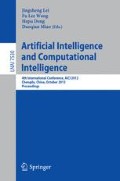Abstract
In the process of association rule mining on rough set, it is always needed to deleting the reduplicative rows or columns, so supports and confidences of association rules cannot be obtained accurately. While the Hasse diagram of quantitative concept lattice contains all the objects and attributes information, supports of nodes can be obtained visually from the lattice, and the vivid association rule mining can be realized. Association rule mining algorithm on quantitative concept lattice effectively avoids the combinatorial explosion problem existing in rough set. Confidences of rules can be obtained accurately via the supports of relative concept nodes, and it can also effectively avoid the problem of information loss existing in rough set reduction, thus the efficiency of association rule mining can be improved.
Access this chapter
Tax calculation will be finalised at checkout
Purchases are for personal use only
Preview
Unable to display preview. Download preview PDF.
References
Agrawal, R., Imielinski, T., Swami, A.: Mining association rules between sets of Items in large databases. In: Proceedings of ACM SIGMOD Conference on Management of Data, Washington, DC, pp. 207–216 (1993)
Hsu, P.Y., Chen, Y.L., Ling, C.C.: Algorithms for mining association rules in big databases. Information Sciences 1(166), 31–47 (2004)
Chen, G.Q., Liu, H.Y., Yu, L., Wei, Q., Zhang, X.: A new approach to classification based on association rule mining. Decision Support Systems 42(2), 674–689 (2006)
Yang, G.F., Mabu, S., Shimada, K., Hirasawa, K.: A novel evolutionary method to search interesting association rules by keyword. Expert Systems with Applications 38(10), 13378–13385 (2011)
Pawlak, Z.: Rough sets. Communication of the ACM 38, 89–95 (1995)
Skowron, A.: The rough sets and evidence theory. Fundaments Informatae 13, 245–262 (1990)
Pawlak, Z.: Rough sets: theoretical aspects of reasoning about data. Kluwer Academic Publishers, Dordrecht (1991)
Wang, G.Y., Hu, H., Yang, D.: Decision table reduction based on conditional information entropy. Chinese J. Computer 25(7), 1–8 (2002) (in Chinese)
Li, J., Wang, X., Fan, X.W.: Improved binary discernibility matrix attribute reduction algorithm in customer relationship management. Procedia Engineering 7, 473–476 (2010)
Li, F., Yin, Y.Q.: Approaches to knowledge reduction of covering decision systems based on information theory. Information Sciences 179(11), 1694–1704 (2009)
Liang, J.Y., Wang, F., Dang, C.Y., Qian, Y.H.: An efficient rough feature selection algorithm with a multi-granulation view. International Journal of Approximate Reasoning 53(6), 912–926 (2012)
Ziarko, W.: Variable precision rough set model. Journal of Computer and System Sciences (46), 39–59 (1993)
Ziarko, W.: Introduction to the special issue on rough sets an knowledge discovery. Computer Intelligence (11), 223–226 (1995)
Wille, R.: Restructuring lattice theory: An approach based on hierarchies of concepts. In: Rival, I. (ed.) Ordered Sets, pp. 445–470. Reidel, Dordrecht (1982)
Du, Y.J., Li, H.M.: Strategy for mining association rules for web pages based on formal concept analysis. Applied Soft Computing 10(3), 772–783 (2010)
Nguyen, L.T.T., Vo, B., Hong, T.P., Thanh, H.C.: Classification based on association rules: A lattice-based approach. Expert Systems with Applications 39(13), 11357–11366 (2012)
Wang, S.K.M., Ziarko, W.: On optimal decision rules in decision tables. Bulletin of Polish Academy of Sciences 33, 693–696 (1985)
Godin, R.: Incremental concept formation algorithm based on Galois (concept) lattice. Computational Intelligence 11(2), 246–267 (1995)
Hu, K.Y., Lu, Y.C., Shi, C.Y.: Advances in rough set theory and its applications. Journal of Tsinghua University 41(1), 64–68 (2001) (in Chinese)
Author information
Authors and Affiliations
Editor information
Editors and Affiliations
Rights and permissions
Copyright information
© 2012 Springer-Verlag Berlin Heidelberg
About this paper
Cite this paper
Wang, D., Xie, Q., Huang, D., Yuan, H. (2012). Analysis of Association Rule Mining on Quantitative Concept Lattice. In: Lei, J., Wang, F.L., Deng, H., Miao, D. (eds) Artificial Intelligence and Computational Intelligence. AICI 2012. Lecture Notes in Computer Science(), vol 7530. Springer, Berlin, Heidelberg. https://doi.org/10.1007/978-3-642-33478-8_19
Download citation
DOI: https://doi.org/10.1007/978-3-642-33478-8_19
Publisher Name: Springer, Berlin, Heidelberg
Print ISBN: 978-3-642-33477-1
Online ISBN: 978-3-642-33478-8
eBook Packages: Computer ScienceComputer Science (R0)

